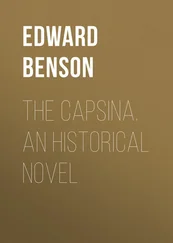Edward Benson - Arundel
Здесь есть возможность читать онлайн «Edward Benson - Arundel» — ознакомительный отрывок электронной книги совершенно бесплатно, а после прочтения отрывка купить полную версию. В некоторых случаях можно слушать аудио, скачать через торрент в формате fb2 и присутствует краткое содержание. Жанр: foreign_prose, на английском языке. Описание произведения, (предисловие) а так же отзывы посетителей доступны на портале библиотеки ЛибКат.
- Название:Arundel
- Автор:
- Жанр:
- Год:неизвестен
- ISBN:нет данных
- Рейтинг книги:4 / 5. Голосов: 1
-
Избранное:Добавить в избранное
- Отзывы:
-
Ваша оценка:
- 80
- 1
- 2
- 3
- 4
- 5
Arundel: краткое содержание, описание и аннотация
Предлагаем к чтению аннотацию, описание, краткое содержание или предисловие (зависит от того, что написал сам автор книги «Arundel»). Если вы не нашли необходимую информацию о книге — напишите в комментариях, мы постараемся отыскать её.
Arundel — читать онлайн ознакомительный отрывок
Ниже представлен текст книги, разбитый по страницам. Система сохранения места последней прочитанной страницы, позволяет с удобством читать онлайн бесплатно книгу «Arundel», без необходимости каждый раз заново искать на чём Вы остановились. Поставьте закладку, и сможете в любой момент перейти на страницу, на которой закончили чтение.
Интервал:
Закладка:
She went out, hatless like him, into the warm bath of sun and south-west wind, and they passed side by side up the weedless garden-path. All Nature, bees and bright-eyed birds and budding flowers, was busy with the great festival of spring and mating-time; nothing was barren but the salted weedless path, so carefully defertilized. The tulips were a brave show, and in their deep bed below the paling a border of wallflowers spun a web of warm, ineffable fragrance. Ellis, returned from his midday hour, was still engaged with the clicking mowing machine on the velvet-napped lawn, and they went on farther till the gravel of the paths of the flower-garden was exchanged for the cinders of the kitchen patch, and the hedge of espaliers hid them from the house. Then he stopped, and a moment afterwards she also, smoothing into place a braid of her bright brown hair. And without agitation came the question, without agitation the reply. Indeed, there was nothing for two sensible young people to be agitated about. Each was fond of the other, neither had seen any one else more desirable, and over the hearts of each lay thick the cobwebs of comfort and motor-cars and prosperous affairs and unimpassioned content. Only as he spoke he felt some vague soul-eclipse, some dispersal of a dream.
Then he drew her towards him and kissed her, and for one moment below the cobwebs in her heart something stirred, ever so faintly, ever so remotely, connected with the slight roughness of his close-shaven face, with the faint scent of soap, of cigarette. But it did not embarrass her.
They stood there for a moment looking into each other's faces, as if expecting something new, something revealed.
"Shall we tell your mother now?" he asked.
Still she looked at him; he was not quite the same as he had been before.
"Oh, in a minute or two," she said.
Suddenly he felt that he had to stir himself somehow into greater tenderness, greater – But he felt disappointed; it had all been exactly as he had imagined.
"I am very happy," he said. "I have thought about this moment so much, Edith."
It was the first time he had used her name.
"Edward!" she said, looking straight at him. "Edward! No, I don't think I shall call you Edward. I must have a name of my own for you."
At the moment the sound of a gong from within the house droned along the garden.
"The motor is round," she said.
This time it was he who delayed, though without passion.
"Your mother will not mind waiting a minute," he said.
"No. What else have you to say to me?"
"Everything; nothing."
She laughed.
"There is not time for the one," she said, "and no time is required for the other. Besides, all the time that there is is ours now."
In all her life she had never phrased a sentence so neat, so nearly epigrammatic. Its briskness was the fruit of the stimulus that had come to her.
They delayed no further, but went back to the house, where Mrs. Hancock was already waiting. She did not attempt to appear surprised at their news, but, placidly delighted at it, kissed them both, and took it for granted that Edward would come in to dine with them that evening. Then, since there was no use in vain repetitions, she reverted to the topic which had to be considered at once.
"Let me see," she said. "I think the motor is round, and Filson has brought down the footstool from my bedroom to see if it is the right height. A quarter to eight, then, dear Edward, to-night; we shall be quite alone, and if you will come in half an hour sooner I have no doubt that you will find my darling dressed and waiting to talk to you. Fancy what a lot you will have to say to each other now! And then, after dinner, as you are drinking your glass of port, I shall claim you for a little conversation, while we send Edith to wait in the drawing-room. Oh, I see you have brought the footstool from the spare room as well, Filson. That was well thought of, as they are of different heights, and one might suit if the other did not. Let me get in, and see which suits me best… Now try them one on top of the other, Filson. Well, really I think that is the most comfortable of all. Edith, dear, are you ready? And I have brought down my patience cards, and if I put them into the pocket under the window at once I can dismiss them from my mind. There! A quarter-past seven, then, dear Edward, for a chat before dinner. Yes, leave the footstools in the car, Filson, and we will measure the height when I come back."
Denton was standing with the door knob in his hand, waiting for orders.
"You might take us first to Slough, Denton," she said, "so that we shall see what the road is like before we join the Bath road next week, and then we can go through the Beeches. We are ten minutes late in starting, but if we are a little late for tea it won't matter for once in a way. Tell Mrs. Williams, Lind, that we may be ten minutes late for tea."
Mrs. Hancock habitually wore a perfectly natural and amiable smile on her pleasant face, except when her rheumatism gave her an exceptional twinge, or, more exceptionally yet, Mrs. Williams was not quite up to the mark. To-day the discovery of the footstools and Edith's engagement seemed to her to be touching examples of the care of Providence, and she was beamingly conscious of the variety of pleasant objects and topics in the world. She laid her hand in Edith's as the car started.
"And now I want to hear all – all about it, darling," she said. "Oh, look, there are two magpies! Is not that lucky? And will you let your window quite down, dear? It is so warm and pleasant this afternoon. I will have mine just half-way up. There! That is nice! And now I want to hear all about it."
Edith returned the affectionate pressure of her mother's hand.
"It was all so sudden, mother," she said, "and yet I was not at all startled. He – Edward stopped when we reached the kitchen-garden, and so I stopped, too. And, without any speeches, he just asked me, and I said 'Yes' at once, as I had always meant to. And then he said he was very happy, and kissed me."
Mrs. Hancock thought that Denton was driving a little too fast, as if he meant to make up the lost ten minutes, but she checked herself from calling down the tube to him.
"My dearest!" she said. "You will never forget the first kiss given you by the man who loves you. Oh, what a jolt!"
The jolt decided her, and she called to Denton not to go quite so fast. Then she pressed Edith's hand again.
"Tell me more, dear," she said. "Had you expected it at all?"
Edith looked at her with complete candour.
"Oh, yes!" she said. "And that is why it seemed so natural when it came."
The faintest flush glowed on her face.
"But I never liked him so much before as when he kissed me," she said. "It did not make me feel at all awkward. I used to think that if such a thing ever happened to me I should not know which way to look. But it all seemed quite natural. Our tastes agree in so many things, too – music and croquet and so on. That is a good thing, is it not?"
Mrs. Hancock beamed again.
"My dear, of course," she said. "Community of taste is half the" – battle, she was going to say – "half the strength and joy of marriage. Oh, here we are in Slough already. Turn to the right, Denton, and go through Burnham Beeches. Yes, what games of croquet you will have, and what music. I will get a gate made in the paling between his garden and ours, so that there will be no need to go round by the front door and ring the bell. I dare say Ellis could do it, or even if I had to get a carpenter it would be but a trifle anyhow, and I certainly shall not permit Edward to pay half of it, however much he may insist. Bless you, my darling! I feel so happy and contented about it. Look, there is a Great Western express. What a pace they go!"
Читать дальшеИнтервал:
Закладка:
Похожие книги на «Arundel»
Представляем Вашему вниманию похожие книги на «Arundel» списком для выбора. Мы отобрали схожую по названию и смыслу литературу в надежде предоставить читателям больше вариантов отыскать новые, интересные, ещё непрочитанные произведения.
Обсуждение, отзывы о книге «Arundel» и просто собственные мнения читателей. Оставьте ваши комментарии, напишите, что Вы думаете о произведении, его смысле или главных героях. Укажите что конкретно понравилось, а что нет, и почему Вы так считаете.











